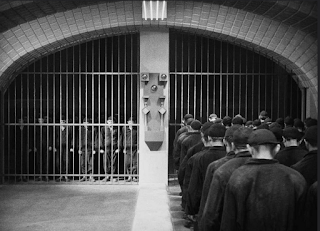Roslyn Buff, the editor-in-chief of the Belltower and a senior in English, shared with me this video on John Green’s thoughts about the fact that his book, Looking for Alaska, has been identified as the most banned or challenged book of 2015 by the American Library Association (ALA):
One of the most popular genres in popular film over the past couple of decades has been dystopic future films, stories that envision a society broken down and the struggle of individuals against a monolithic state. Such films would include the Hunger Games series, the Divergent series, The Giver, the Matrix series, The Fifth Element (directed by the great French director Luc Besson), the off-beat Brazil (directed by Monty Python’s Terry Gilliam). Filmmakers in early decades even produced films in this genre, for example consider 1966’s Farenheit 451 (an adaptation of Ray Bradbury’s great novel) and Fritz Lang's 1927 German classic, Metropolis. Even the Alien series is dystopic at heart.
 |
| Screenshot from Metropolis, Fritz Lang's film about a dystopic future that seemed to eerily predict the Holocaust in some ways. (Image in the public domain) |
One of the most significant aspect of these stories is how governments and/or large corporations try to control what knowledge is available to normal, every-day citizens. These stories rest on an idea that was wonderfully expressed by John Dewey, one of America’s leading philosophers of education in his influential book, Democracy and Education:
“Knowledge is humanistic in quality not because it is about human products in the past, but because of what it does in liberating human intelligence and human sympathy.”
 |
John Dewey (Image in the public domain) |
The governments/corporations in these stories try to suppress human intelligence and human sympathy, often times using violence and manipulating economic relationships to do this—forcefully shown in Elysium (2013).
Unfortunately, these stories take cues from history. Totalitarian governments and even power-hungry politicians have always recognized that regulating what the “people” know can be a powerful tool for control. For example, Josef Goebbels, the propaganda minister in Nazi-era Germany, lead an extensive effort to control public knowledge which included the famous book burnings. Soviet-era Eastern European countries used extensive citizen-spy networks that reported on “suspicious” materials being read and written by neighbors and family members; many great writers of the era were killed or imprisoned for what they wrote, for the ideas they tried to share. The United States has even struggled with censorship—think of the famous “black list” of writers, actors, and filmmakers from the 1950s-1960s (just to mention a well-known example). More recently, the Department of Defense has tried to control what images journalists have been able to publish during the long-running War on Terror.
 |
| Nazi book burning, Berlin 1933 (Image in the public domain) |
Banning and challenging books in school and public libraries is a form of censorship, a form of trying to control what knowledge and ideas people have access to. These efforts present a challenge to the First Amendment right of free expression. In our current political climate, this freedom is as important as it has ever been. The O’Grady Library has sponsored programming this week to support the ALA’s Banned Book Week initiative to remind us that learning and knowledge gained from reading is a basic human right and we need to consciously protect them (see the Universal Declaration of Human Rights, articles 18, 19, 20, 26, & 27).

No comments:
Post a Comment